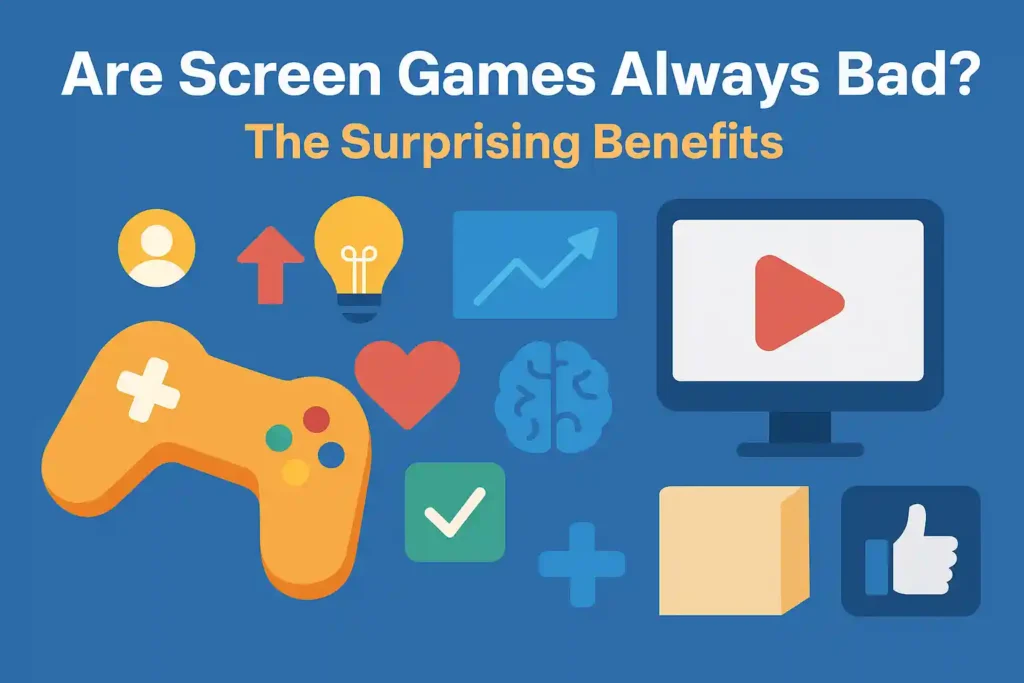Introduction
When people hear the phrase “screen games”, they often think of wasted hours, poor eyesight, and endless scrolling. Parents worry that kids are glued to screens too long, teachers see it as a distraction, and even adults often feel guilty after playing for hours.

But here’s the truth: screen games are not always bad. In fact, when used in moderation and with the right choices, they can offer surprising benefits—from improving mental agility to boosting social connections.
In this blog, we’ll break down the misconceptions, explore the hidden advantages, and show why screen games can actually be good for you.
The Negative Reputation of Screen Games
Before we get to the good stuff, here are some widely held concerns:
Excessive Screen Time: Can cause eye strain, poor posture, reduced sleep quality.
Addictive Design: Games designed with reward loops that can pull players into longer sessions than intended.
Neglect of Responsibilities: Work, studies, or social interactions sometimes take a backseat.
Potential for Exposure to Violent or Inappropriate Content: Especially for younger users.
These are real, and they matter. But, as many studies find, context (which game, how long, at what times, etc.) makes a huge difference.
The Surprising Benefits of Screen Games
Here are some science-backed and real-world benefits of playing screen games:
1. Boosts Brain Power and Problem-Solving Skills
Many games require strategy, logic, and quick thinking. Puzzle games like Sudoku apps, brain teasers, or adventure titles with missions help improve critical thinking and decision-making.
A study in Nature found that playing strategy games can enhance problem-solving skills and memory.
2. Enhances Hand-Eye Coordination
Games that require precise movements—like racing, sports, or action games—train your reflexes and coordination. Surgeons have even reported improved accuracy after practicing with certain video games!
3. Encourages Learning Through Play
Educational games make learning fun for kids. From math challenges to language-learning apps, screen games can transform boring subjects into engaging activities.
For adults, simulators (like flight or driving games) provide practical training in a risk-free environment.
4. Reduces Stress and Promotes Relaxation
Life can be overwhelming. Playing casual games on your phone or PC gives your brain a break from daily stress. Games like Stardew Valley or Animal Crossing are popular because they’re relaxing and calming.
5. Improves Social Connections
Far from isolating players, many games actually bring people together. Online multiplayer games allow friends (and strangers) from different parts of the world to connect, collaborate, and compete.
During the pandemic, games like Among Us and Minecraft became safe spaces for socializing.
6. Builds Persistence and Patience
Losing in a game is frustrating—but it teaches players resilience. You try again, learn from mistakes, and eventually succeed. This builds persistence that can transfer to real-life challenges.
7. Fosters Creativity
Games with open worlds and building mechanics (like Roblox, The Sims, or Minecraft) allow players to express their creativity. Many young players develop storytelling and design skills through these platforms.
8. Improves Multitasking Ability
Fast-paced games demand quick reactions, memory recall, and task management. Players often juggle several objectives at once, training the brain to multitask more effectively.
9. Helps With Mental Health
Some research suggests games can help fight depression and anxiety by offering a sense of achievement and distraction from negative thoughts. Therapeutic games are even being developed specifically for mental health care.
10. Accessible Fun for All Ages
From toddlers to seniors, screen games are easy to access and provide entertainment without requiring expensive equipment. Senior-friendly games have even been shown to improve memory and cognitive health in older adults.
The Key: Balance and Healthy Habits
Like most things, balance is everything. Here are some tips to ensure screen games remain beneficial:
Set time limits – Avoid binge-playing for hours. Short sessions are healthier.
Choose the right games – Go for games that stimulate the brain, encourage social play, or relax the mind instead of endless grinding titles.
Take breaks – Follow the 20-20-20 rule: every 20 minutes, look 20 feet away for 20 seconds to reduce eye strain.
Mix with offline activities – Exercise, socialize in person, and enjoy outdoor hobbies alongside gaming.
Play together – Parents can bond with kids by playing family-friendly games.
Real-Life Examples of Positive Gaming
Brain Training Site(Aklic) – Millions of adults use games like Sudoku or Classic Chess to sharpen their memory and focus.
Esports Careers – Competitive gaming now offers real career opportunities and scholarships.
Therapeutic Games – Hospitals use games to distract children from pain during treatments.
Elderly Programs – Nursing homes incorporate games like Wii Sports to keep seniors active and engaged.
FAQs
Q: Are screen games good for kids at all ages?
Yes—but age matters. Young children need developmentally appropriate content, supervised time, and breaks. Older kids/adults benefit more from strategy, social, or creative games.
Q: Will too many screen games always hurt eyesight?
Not always. Eye strain is real, but mitigated with breaks, good lighting, proper posture, and not gaming in the dark.
Q: Can screen games help with mental health?
Moderately yes. They can reduce stress or anxiety, especially when designed for wellness. But they aren’t a substitute for therapy when needed.
Q: What kinds of screen games are most beneficial?
Games that involve problem-solving, creativity, social interaction, or relaxation tend to offer more positive effects.
Final Thoughts
So, are screen games always bad? The answer is a clear no. While too much screen time can have downsides, the right games in the right balance can offer mental, social, and emotional benefits.
From sharpening problem-solving skills to strengthening friendships, screen games are more than just digital distractions—they’re powerful tools for learning, connecting, and relaxing.
Instead of asking “Are games bad?”, maybe the real question we should be asking is: “How can we use games in a healthy and positive way?”
